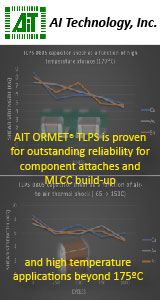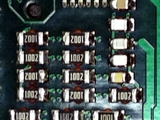A"hot tweezer" adapter for a soldering station probably will do the trick forremoval. It will heat both joints and the component can then be gently rotatedto break the adhesive bond and lifted. Alternatively, a hot air gun can be usedto heat the component and reflow both joints, and a tweezers can then be usedto gently twist the component to remove it. Any process that you use needs tobe qualified to set the process parameters such that the PWB and surroundingcomponents are not damaged. When reworking multilayer ceramic chip capacitors,I suggest a hot air process to minimize thermal shock, especially for largercomponents.
Fritz Byle
Process Engineer
Astronautics
Fritz's career in electronics manufacturing has included diverse engineering roles including PWB fabrication, thick film print & fire, SMT and wave/selective solder process engineering, and electronics materials development and marketing. Fritz's educational background is in mechanical engineering with an emphasis on materials science. Design of Experiments (DoE) techniques have been an area of independent study. Fritz has published over a dozen papers at various industry conferences.
I would suggestthe use of Thermal Soldering Tweezers. This tool features two heated points ina tweezer configuration. The heated tips will reflow the solder joint on bothsides of the chip simultaneously and allow you to grasp the chip with security.Once the soldering has fully melted you can give the chip a slight twist tobreak the glue joint and lift the chip from the board.
IPC 7711 method 3.3.2lists the full, step-by-step procedure See: IPC-7711B-7721B_Chip_Component_Removal_Tweezer_Method.pdf
Kris Roberson
Manager of Assembly Technology
IPC
Kris Roberson has experience as a machine operator, machine and engineering technician and process engineer for companies including Motorola, and US Robotics. Kris is certified as an Master Instructor in IPC-7711 / 7721, IPC A-610 and IPC J-STD 001.
|






